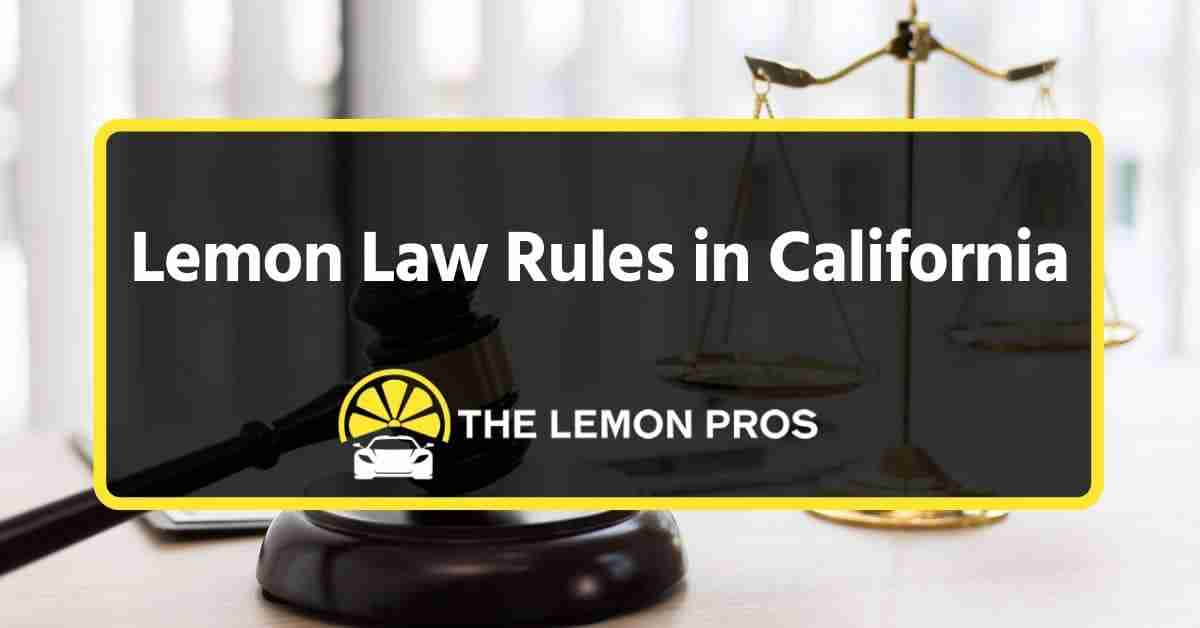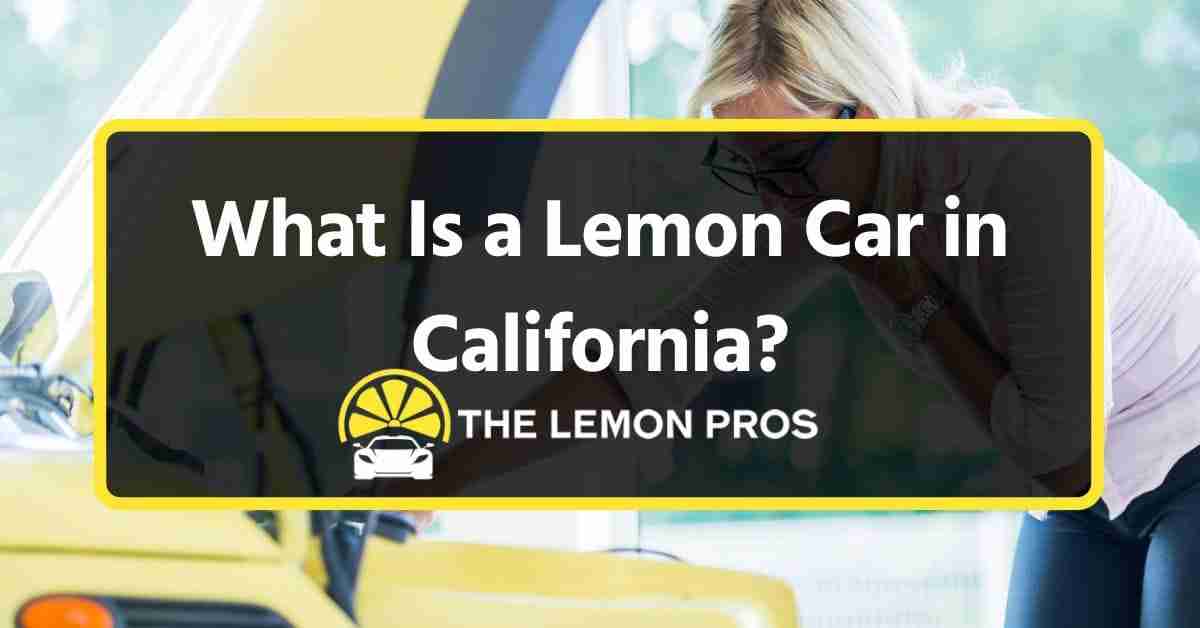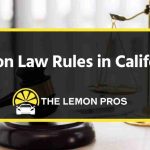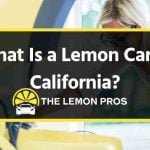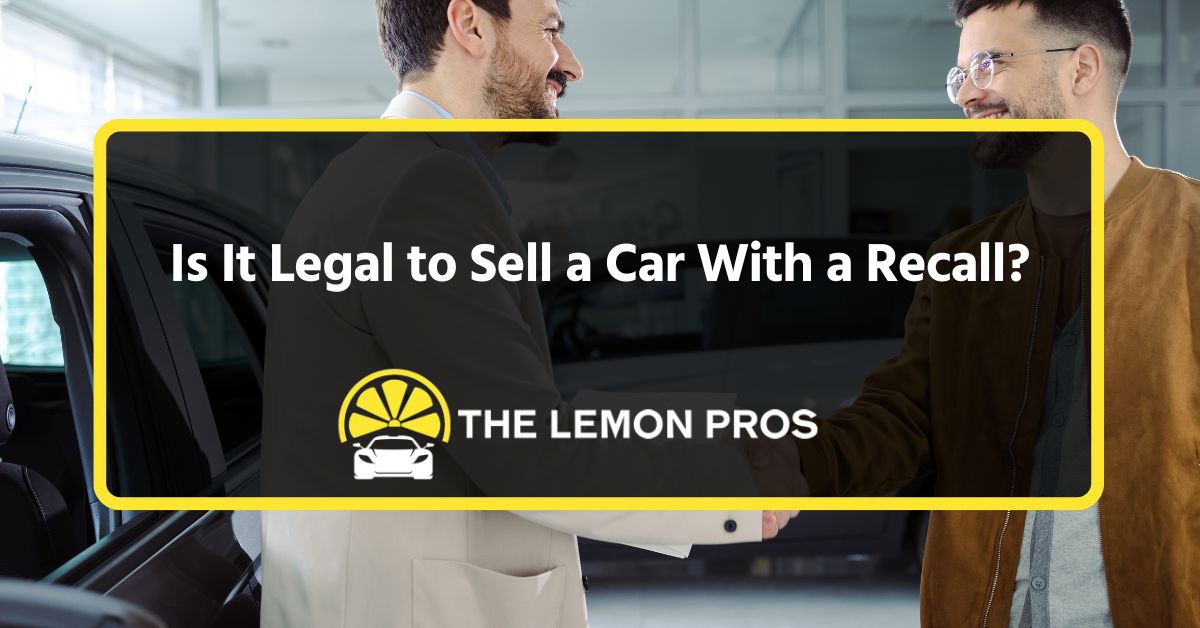
Is It Legal to Sell a Car With a Recall?
A used vehicle with low mileage and a clean interior may appear to be a great deal, but is it still a good option after you find out there is an open recall for faulty airbags? Usually, a recall makes that bargain seem a lot less safe. It’s a statement noting there’s something wrong with the vehicle that requires prompt attention.
In California, dealers must disclose any open recalls when selling a used car. New car dealers are not permitted to sell the vehicle until the recall is addressed. Should the dealers violate these rules, action can be taken by the consumer, so it’s important to understand the regulations and your rights.
The Lemon Pros understand the gravity of having open safety recalls fixed promptly. With a practice area focused on lemon vehicles, our team of professionals knows how to get compensation from new and used car dealers that don’t follow the law. Contact us today for a free consultation to find out how we can help you.
In this post, we discuss the vital importance of an open recall and tell you what car dealerships should be doing. We also help you see if your vehicle may be a lemon and give you tips to prevent buying a defective car.
Table Of Contents
What Is a Vehicle Recall?
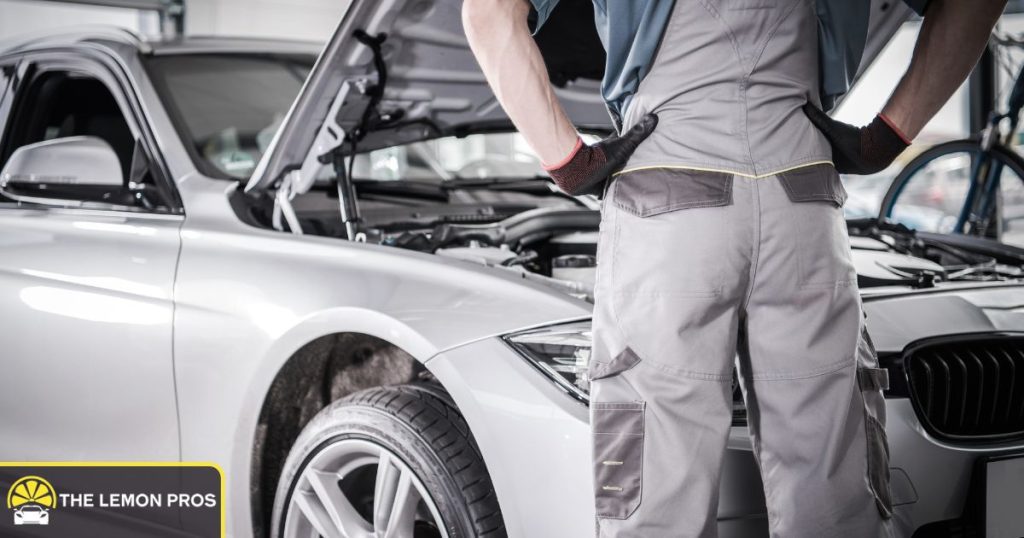
A car recall is issued by the manufacturer or the National Highway Traffic Safety Administration (NHTSA) stating that there’s a defect with a vehicle that needs to be repaired immediately. These issues are serious enough to warrant a free repair from the manufacturer. There are two types of recalls:
- Voluntary recalls, sent by the manufacturer, usually to get ahead of potential legal issues.
- Mandatory recalls, ordered directly by the NHTSA when the safety defect is confirmed through crash reports and investigations.
Common reasons for recalls include defective airbags, faulty seatbelts, steering malfunctions, bad brakes, emissions-related issues, and other system failures. Some of the most common signs of car problems can turn into a recall if they are occurring on a wide scale and could lead to safety hazards.
When the recall is issued, the manufacturer is required to notify all registered owners by mail. These notices should explain the defect, tell you of the risk, and give you steps to get it repaired at no cost.
Can Someone Legally Sell You a Car With an Open Recall?
It depends on where you live and the dealer's situation. In the United States, federal law states that franchised dealers may not sell new vehicles with an open safety recall. This regulation, known as the National Traffic and Motor Vehicle Safety Act, states that dealers must repair the defect before selling the vehicle.
As far as selling used vehicles with an open recall, these regulations fall to the state. In California, the Consumer Legal Remedies Act (CLRA) prohibits dealerships from engaging in unfair or deceptive practices, including failing to disclose the recall status of a used vehicle. However, the dealers aren’t responsible for having the recalls repaired. Private sellers in California have no guidelines, as these vehicles are sold as-is.
Some states have no regulations about selling used cars with recalls. In some cases, cars can be sold with no disclosure at all, such as in Ohio, Florida, Michigan, and North Carolina. For this reason, you should always research local regulations before purchasing a vehicle.
More federal and local laws continue to emerge as consumers raise awareness of dealership fraud and poor practices. For example, pioneers such as Rosemary Shahan continue to work with Consumers for Auto Reliability and Safety (CARS) to spearhead more laws and regulations.
Selling a Recalled Car: Used Car Dealers vs. Private Sellers
Here are the main differences in selling vehicles that have a recall in California:
Dealers
To comply with regulations requiring full disclosure, franchised and independent dealers should always let potential buyers know about open recalls. However, they are not required to fix the recall.
Private Sellers
There are no laws requiring private sellers to disclose or fix the recalls. It is up to the buyer to perform due diligence on the vehicle before purchasing it.
Which Car Sellers Are Legally Required to Disclose Recalls
Many states don’t require private sellers to disclose recalls. In California, dealers have more obligations than the private seller, but still aren't required to repair the recalls. The dealer is only required to disclose the recall to you, which is why you want to make sure you are always asking the right questions to avoid buying a lemon car.
How to Check if a Car Has an Open Recall Before Buying

Your car contains a Vehicle Identification Number (VIN) that acts as its serial number. You can use this VIN to check for open recalls. Simply enter the VIN on the NHTSA website to get a list of open recalls. This is a good practice to do before buying the vehicle.
If there is an open recall and the seller hasn’t disclosed it, this could be a warning sign that something is wrong. After all, what else could they be hiding?
Additionally, you can spot some red flags just by looking at the online listing. Here are some examples of what to watch for:
- Extremely low price: If the price is well below market value, the listing could be a scam.
- Vague descriptions: When the listing lacks detail or simply says: “runs great,” you know the seller may be hiding something.
- Missing VIN: If the VIN is missing or the identifying marker looks fake, the seller may be attempting to commit fraud.
- Lack of high-quality photos: When photos are blurry or cropped, the seller may be hiding damage.
You also want to watch out for missing titles. If the seller wants you to put down money to hold the vehicle but the title isn’t yet available, it’s best to walk away. You should always avoid buying from anyone who puts pressure on you to act fast.
What Happens if You Buy a Car With a Recall?
Consumers wrongly assume that the vehicle can be returned to the dealership if there’s a problem following a sale, but that’s not true. As a customer, you have several rights, but you don’t generally have the ability to return a car you don’t want.
If there’s a recall on the car after the sale, you can still have it fixed. The authorized dealer must perform the necessary repairs at no cost to you. However, it’s important to realize that these repair attempts don’t erase your Lemon Law rights. If the car returns to you and isn’t fixed, you may have the legal right to get compensation and possibly return the car.
How a Recall Could Be a Sign of a Lemon
In 2024 alone, there were more than 35 million vehicles involved in safety recalls. Sadly, it’s all too common for cars to have recalls these days. If your car ends up being recalled, it doesn’t necessarily mean that it’s also a lemon.
With that said, if the car has been in the repair shop multiple times for the same recall with no resolution, you may have a lemon. For this reason, you want to keep all of the recall and repair records in case you need to file a Lemon Law claim.
Is Your Recalled Vehicle Actually a Lemon?
If you have a car with recurring problems, you may be facing more than just bad luck. You may have a lemon. Here are some criteria for California Lemon Law, otherwise known as the Song-Beverly Consumer Warranty Act:
- The car has been in the shop for multiple repairs for the same issue
- The vehicle has been in the shop for more than 30 days for the recall repair
- The defect substantially impairs the safety, value, or use of the vehicle
Most Lemon laws are focused on the new vehicle. It must be covered under the manufacturer’s warranty, and the defect needs to have started within the first 18,000 miles or 18 months, whichever comes first. However, there’s also a Lemon Law for used cars, in some instances. To ensure your vehicle qualifies, you should meet with a lawyer for car problems.
What to Do if Your Recalled Car Is a Lemon
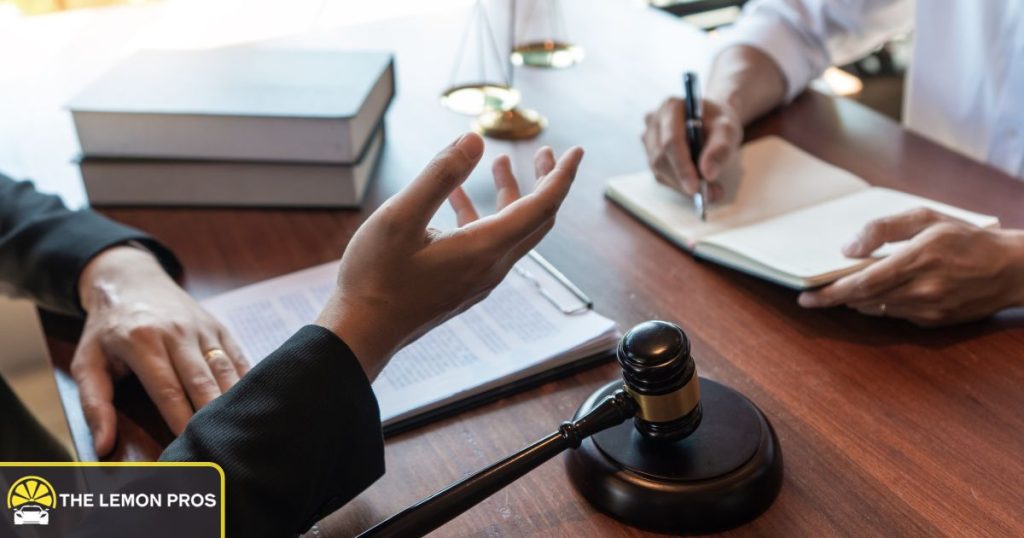
When the recalled car can't be repaired, it's often classified as a lemon. Do you know what to do if your car is a lemon? The steps aren’t complicated, but you must act quickly.
Gather your repair records: You will need proof of the repair attempts to win your case. Put all of your documentation in chronological order and make sure all of the issues have been well-documented.
Learn state Lemon laws: Because every state has different requirements, you want to get more information on the laws local to you.
Consult a Lemon Law attorney: Most attorneys offer a free case evaluation and only get paid when you win your case. If you want to go up against the largest auto manufacturers, you need a tough lawyer on your team.
Send a demand letter: Your lawyer should have a simple form that can be sent to the manufacturer and/or dealer. This is a required step before starting a Lemon Law claim in California.
While it’s important to maintain good communication with the dealership, you don’t need them to tell you what your rights are. Let’s face it; they are trying to avoid liability in all cases. Instead, you want to act quickly with a qualified attorney. In California, the Lemon Law time limit is only four years, but we always advise filing as early as possible.
Best of all, you may be able to avoid court by following these steps. Some buyers will be offered vehicle replacement or a Lemon Law buyback with the right attorney working with them.
Think You Bought a Lemon?
Lots of governing authorities, such as the Federal Trade Commission (FTC), are working hard to protect consumers from dealer fraud and misrepresentation. Because of this, you have options after you purchase a car with open recalls, especially if the dealer participated in illegal practices. Above all, it’s important that you are driving a safe and reliable vehicle.
The Lemon Pros can help you report the dealership and fight for compensation. Because we are called the best Lemon Law attorneys in California, we can help you get back everything that’s been lost. Contact us today for your free case evaluation.
FAQ
Is It Okay to Buy a Used Car With a Recall?
By being willing to buy a car with a recall, you have access to a lot more options, especially regarding private sellers. Yet, this isn’t always the best decision. You need to be aware that a recall could quickly turn into a defect that can’t be repaired, and you may have no rights under the Lemon Law to get compensation.
Can You Get Your Money Back if There Is a Recall on Your Car?
Typically, you can’t simply return a car because there are problems after the sale. However, if you work with an expert Lemon Law attorney, you may be able to have the car replaced with the same make and model or get compensation.
Are Dealers Responsible for Fixing Used Vehicles With a Recall?
In California, there’s no regulation forcing dealers to fix a used car with a recall. They are only required to disclose that information to buyers. New vehicles are subject to different regulations and cannot be sold with an open recall.
Is There a Federal Law for Selling Vehicles With a Recall?
In the United States, federal law states that franchised dealers may not sell new vehicles with an open safety recall through the National Traffic and Motor Vehicle Safety Act. Sadly, there aren’t any federal regulations about used cars. Those laws fall back on the state. In California, the Consumer Legal Remedies Act (CLRA) prohibits dealerships from engaging in unfair or deceptive practices, including failing to disclose the status of a used vehicle, but there’s no regulation forcing the dealership to fix the recall.

